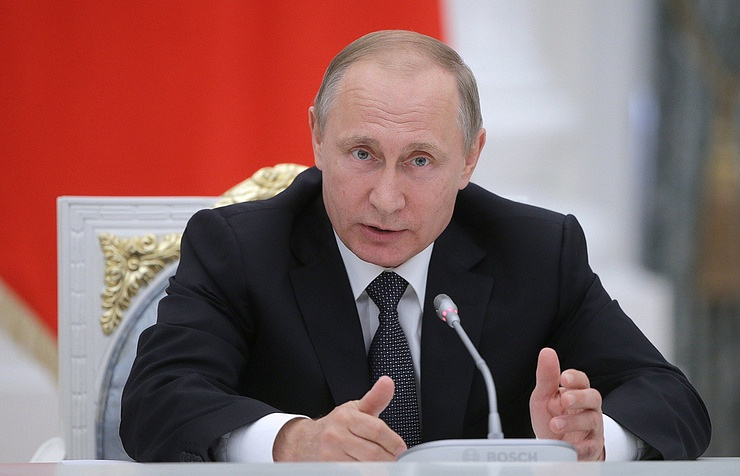Russian President Vladimir Putin on Thursday leaves for Uzbekistan to take part in a two-day summit of the Shanghai Cooperation Organization (SCO) which will be followed by an official visit to China.
Putin’s schedule for the next three days includes meetings with a number of foreign leaders in various formats. The topics for discussion will primarily be trade-and-economic and humanitarian cooperation, global and regional problems, including the situation in Syria and Afghanistan.
Russia-China-Mongolia and other meetings in Tashkent
On Thursday, the Russian president will have a brief bilateral meeting with China’s President Xi Jinping on the sidelines of the SCO summit in Tashkent, Putin’s aide Yuri Ushakov told journalists.
The two leaders will also take part in trilateral talks with Mongolian President Tsakhia Elbegdorj. It will be the third meeting in this format. The two previous meetings of the three leaders were held in 2014 and 2015, also on the sidelines of the summit meetings of the Shanghai Cooperation Organization in Dushanbe and Ufa, respectively.
The Tashkent meeting is expected to focus on further development of relations between the three countries and sign a number of documents, including a program of the establishment of a Russia-China-Mongolia economic corridor comprised of about 30 projects, Ushakov said.
Apart from that, it is planned to agree an intergovernmental agreement on international shipments along the network of Asian motor roads and an inter-ministerial agreement on mutual recognition of customs control in respect of certain types of goods. The presidential aide did not rule out that the three presidents may raise other issues of the regional and international agenda.
On the following day, June 24, Putin is scheduled to have a brief meeting with the host of the summit, Uzbekistan’s President Islam Karimov.
Also in Tashkent, Putin is expected to meet with Indian Prime Minister Narendra Modi. According to the Kremlin press service, this contact is important “in the run-up to our bilateral summit with the Indians, which will be held in India in October in conjunction with the BRICS summit, which will be held in India’s Goa.”
The meeting will focus on India’s application for membership in SCO, as well as certain “issues of bilateral relations, in particular, issues related to cooperation in the energy sector,” Ushakov said, adding he does not rule out that the two leaders will raise other subjects as well.
SCO agenda
Traditionally, the program of first day of the annual summit of the Shanghai Cooperation Organization, this year timed to mark its 15th anniversary, provides only for an informal dinner, with talks in narrow and extended formats and other events planned for Friday, June 24.
The summit will yield a Tashkent declaration, a plan of actions for 2016-2020 and a number of other documents. According to the Kremlin aide, the summit is expected to discuss concrete steps to improve the SCO’s activity and develop cooperation in the priority spheres, such as security, counterterrorism, economic and humanitarian ties.
In addition, the SCO states’ leaders intend to exchange views on key global and regional issues, including the situation in Afghanistan and in the Middle East. Other subjects for discussion include trade-and-economic interaction. “Issues of harmonization of Eurasia’s integration projects, including the Eurasian Economic Union and the economic belt Silk Road, will be considered separately,” Ushakov said, adding that the summit participants would also discuss the involvement of the ASEAN countries in this partnership.
The process of admission of India and Pakistan, according to Ushakov, will enter the final stage at the Tashkent summit and the two countries will join the organization as full-fledged members at its next summit in Kazakhstan in June 2017. Apart from that, the Kremlin sees no grounds not to satisfy Iran’s application for SCO membership once this country has got rid of United Nations sanctions.
The Shanghai Cooperation Organization (SCO) is a permanent regional association founded in Shanghai, China, on June 15, 2001. Its priority tasks include joint counteraction to terrorism and extremism; cooperation in education as well as in the energy, oil and gas, transport, communication and other spheres. At present, the SCO comprises Russia, Kazakhstan, Kyrgyzstan, China, Tajikistan and Uzbekistan. Afghanistan, Belarus, India, Iran, Mongolia and Pakistan enjoy an observer status. Turkey, Sri Lanka, Armenia, Nepal, Cambodia and Azerbaijan are dialogue partners. The SCO summit in Russia’s Ufa in July 2015 adopted the organization’s development strategy and launched the process of accession of India and Pakistan.
Iran has been enjoying the observer status since 2005. It applied for full-fledged membership in 2008. After it was declared at the beginning of the current year that international sanctions will be lifted off Iran, all obstacles hindering its full-fledged membership in the Shanghai Cooperation Organization were removed.
From Tashkent to Beijing
After the SCO summit, Putin will go on an official visit to China where he will have talks with that country’s leaders on June 25 on the entire spectrum of issues of the bilateral and international agenda. The Kremlin expects the visit will be busy and productive. According to Ushakov, Russia and China are working on more than 50 document which can be signed on the sidelines of the visit in the presence of Putin and Xi Jinping.
The two leaders are expected to kick off talks on the preparation of an agreement between the Eurasian Economic Union and China’s Silk Road Economic Belt project, discuss energy cooperation, including the Power of Siberia gas pipeline, the launch of a program of joint development of a wide-body long-haul plane and a heavy civil helicopter and the construction of a high-speed railway linking Moscow and Kazan, as well as establishment of a new land gain corridor from Russia.
Apart from that, the Russian and Chinese leaders plans to “agree to boost cooperation within international format,” Ushakov said, adding that Moscow and Beijing “have nearly identical or close position on literally all key issues of the international agenda.” Other topics for discussion will include Syrian settlement, the situation in Afghanistan and the Korean peninsula, and others.
